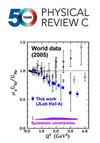Systematic study of flow vector fluctuations in
s N N = 5.02
IF 3.2
2区 物理与天体物理
Q2 PHYSICS, NUCLEAR
引用次数: 0
Abstract
Measurements of the pT-dependent flow vector fluctuations in Pb–Pb collisions at sNN=5.02TeV using azimuthal correlations with the ALICE experiment at the Large Hadron Collider are presented. A four-particle correlation approach [ALICE Collaboration, ] is used to quantify the effects of flow angle and magnitude fluctuations separately. This paper extends previous studies to additional centrality intervals and provides measurements of the pT-dependent flow vector fluctuations at sNN=5.02TeV with two-particle correlations. Significant pT-dependent fluctuations of the V⃗2 flow vector in Pb–Pb collisions are found across different centrality ranges, with the largest fluctuations of up to ∼15% being present in the 5% most central collisions. In parallel, no evidence of significant pT-dependent fluctuations of V⃗3 or V⃗4 is found. Additionally, evidence of flow angle and magnitude fluctuations is observed with more than 5σ significance in central collisions. These observations in Pb–Pb collisions indicate where the classical picture of hydrodynamic modeling with a common symmetry plane breaks down. This has implications for hard probes at high pT, which might be biased by pT-dependent flow angle fluctuations of at least 23% in central collisions. Given the presented results, existing theoretical models should be reexamined to improve our understanding of initial conditions, quark–gluon plasma properties, and the dynamic evolution of the created system. ©2024 CERN, for the ALICE Collaboration 2024 CERN对 sNN=5.02 Te 中流动矢量波动的系统研究
本文介绍了在sNN=5.02TeV的Pb-Pb对撞中,利用大型强子对撞机上的ALICE实验的方位角相关性对依赖于pT的流矢量波动的测量结果。采用四粒子相关方法[ALICE 协作]来分别量化流角和流幅波动的影响。本文将先前的研究扩展到了更多的中心性区间,并提供了在 sNN=5.02TeV 条件下利用双粒子相关性对 pT 依赖性流矢量波动的测量结果。在Pb-Pb碰撞中,不同中心度范围内的V⃗2流矢量都出现了显著的pT相关波动,其中5%最中心碰撞中的波动最大,可达15%。同时,没有证据表明 V⃗3 或 V⃗4 的波动与 pT 有关。此外,在中心对撞中还观察到流角和流幅波动的证据,其重要程度超过 5σ。在 Pb-Pb 对撞中的这些观察结果表明,具有共同对称平面的流体力学建模的经典图景在哪里被打破。这对高 pT 下的硬探测有影响,因为在中心对撞中,与 pT 有关的流角波动可能会造成至少 23% 的偏差。鉴于上述结果,我们应该重新审视现有的理论模型,以改进我们对初始条件、夸克-胶子等离子体特性以及所创造系统的动态演化的理解。 ©2024欧洲核子研究中心,ALICE 合作组织版权所有 2024 欧洲核子研究中心
本文章由计算机程序翻译,如有差异,请以英文原文为准。
求助全文
约1分钟内获得全文
求助全文
来源期刊

Physical Review C
PHYSICS, NUCLEAR-
CiteScore
5.80
自引率
35.50%
发文量
863
期刊介绍:
Physical Review C (PRC) is a leading journal in theoretical and experimental nuclear physics, publishing more than two-thirds of the research literature in the field.
PRC covers experimental and theoretical results in all aspects of nuclear physics, including:
Nucleon-nucleon interaction, few-body systems
Nuclear structure
Nuclear reactions
Relativistic nuclear collisions
Hadronic physics and QCD
Electroweak interaction, symmetries
Nuclear astrophysics
 求助内容:
求助内容: 应助结果提醒方式:
应助结果提醒方式:


